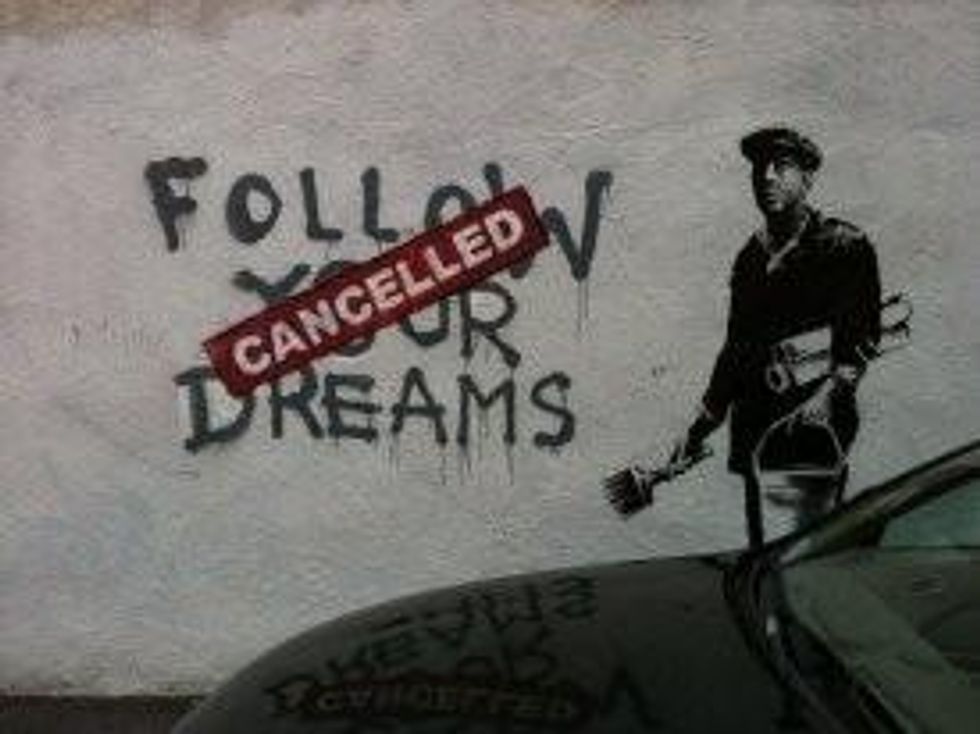Stiglitz: 'American Dream Has Become a Myth'
In an interview with DER SPIEGEL, economist Joseph Stiglitz blasts austerity, slams "economic manipulation" by financial elite
In an interview published Tuesday with German newspaper DER SPIEGEL, noted Columbia University economist and 2001 Nobel Prize winner Joseph Stiglitz says that "the American dream has become a myth" and calls Gov. Romney "emblematic of the top one percent."
Stiglitz highlights the inequality in the U.S. that has grown "dramatically" as wealth is concentrated in the upper echelon because the "marvelous economic machine" in the U.S. reinforces the division. This division is seen in comments like those by Romney disparaging 47% of Americans that show the total disconnect those at the top have with everyone else, according to Stiglitz.
It is "anecdotes" that keep the myth of the American dream alive, says Stiglitz. Yet this dream "is not supported by the data."
Stiglitz slams those who "in the financial sector [who] got rich by economic manipulation and by deceptive" practices, taking advantage of and profiting off predatory systems. Asked by DER SPIEGEL why the government didn't stop these practices, Stiglitz says it's because the financial elite "buy the rules that allow them to make the money."
Stiglitz also addresses what he feels is needed to get out of financial crisis, both in the U.S. and the EU.

Stiglitz says that government spending, not cuts, is necessary to create jobs. While DER SPIEGEL says that this investment can lead to "questionable" return, Stiglitz says that even in less than ideal outcomes the amount pales in comparison to the billions spent bailing out the banks.
An Urgent Message From Our Co-Founder
Dear Common Dreams reader, The U.S. is on a fast track to authoritarianism like nothing I've ever seen. Meanwhile, corporate news outlets are utterly capitulating to Trump, twisting their coverage to avoid drawing his ire while lining up to stuff cash in his pockets. That's why I believe that Common Dreams is doing the best and most consequential reporting that we've ever done. Our small but mighty team is a progressive reporting powerhouse, covering the news every day that the corporate media never will. Our mission has always been simple: To inform. To inspire. And to ignite change for the common good. Now here's the key piece that I want all our readers to understand: None of this would be possible without your financial support. That's not just some fundraising cliche. It's the absolute and literal truth. We don't accept corporate advertising and never will. We don't have a paywall because we don't think people should be blocked from critical news based on their ability to pay. Everything we do is funded by the donations of readers like you. Will you donate now to help power the nonprofit, independent reporting of Common Dreams? Thank you for being a vital member of our community. Together, we can keep independent journalism alive when it’s needed most. - Craig Brown, Co-founder |
In an interview published Tuesday with German newspaper DER SPIEGEL, noted Columbia University economist and 2001 Nobel Prize winner Joseph Stiglitz says that "the American dream has become a myth" and calls Gov. Romney "emblematic of the top one percent."
Stiglitz highlights the inequality in the U.S. that has grown "dramatically" as wealth is concentrated in the upper echelon because the "marvelous economic machine" in the U.S. reinforces the division. This division is seen in comments like those by Romney disparaging 47% of Americans that show the total disconnect those at the top have with everyone else, according to Stiglitz.
It is "anecdotes" that keep the myth of the American dream alive, says Stiglitz. Yet this dream "is not supported by the data."
Stiglitz slams those who "in the financial sector [who] got rich by economic manipulation and by deceptive" practices, taking advantage of and profiting off predatory systems. Asked by DER SPIEGEL why the government didn't stop these practices, Stiglitz says it's because the financial elite "buy the rules that allow them to make the money."
Stiglitz also addresses what he feels is needed to get out of financial crisis, both in the U.S. and the EU.

Stiglitz says that government spending, not cuts, is necessary to create jobs. While DER SPIEGEL says that this investment can lead to "questionable" return, Stiglitz says that even in less than ideal outcomes the amount pales in comparison to the billions spent bailing out the banks.
In an interview published Tuesday with German newspaper DER SPIEGEL, noted Columbia University economist and 2001 Nobel Prize winner Joseph Stiglitz says that "the American dream has become a myth" and calls Gov. Romney "emblematic of the top one percent."
Stiglitz highlights the inequality in the U.S. that has grown "dramatically" as wealth is concentrated in the upper echelon because the "marvelous economic machine" in the U.S. reinforces the division. This division is seen in comments like those by Romney disparaging 47% of Americans that show the total disconnect those at the top have with everyone else, according to Stiglitz.
It is "anecdotes" that keep the myth of the American dream alive, says Stiglitz. Yet this dream "is not supported by the data."
Stiglitz slams those who "in the financial sector [who] got rich by economic manipulation and by deceptive" practices, taking advantage of and profiting off predatory systems. Asked by DER SPIEGEL why the government didn't stop these practices, Stiglitz says it's because the financial elite "buy the rules that allow them to make the money."
Stiglitz also addresses what he feels is needed to get out of financial crisis, both in the U.S. and the EU.

Stiglitz says that government spending, not cuts, is necessary to create jobs. While DER SPIEGEL says that this investment can lead to "questionable" return, Stiglitz says that even in less than ideal outcomes the amount pales in comparison to the billions spent bailing out the banks.

